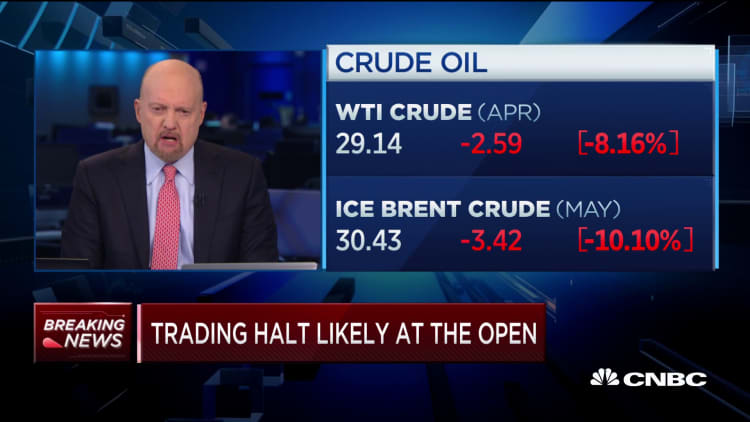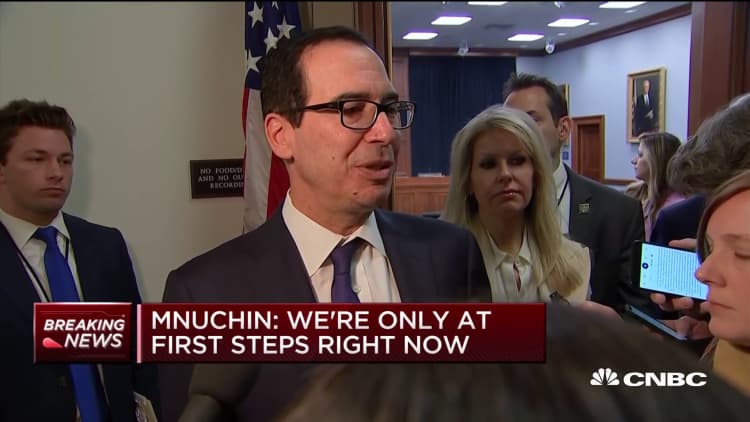The Trump administration has called for a delay to the April 15 tax deadline. Taxpayers are still in the dark on when they'll need to submit paperwork and pay Uncle Sam.
In fact, today – March 16 – marked a deadline for small businesses, namely S-corporations and partnerships, to turn in their 2019 income tax returns.
It's been nearly a week since Treasury Secretary Steven Mnuchin said his department would recommend a delay "for virtually all Americans, not the super-rich" in light of concerns around the coronavirus pandemic.

No formal guidance has come from the federal government on how taxpayers and accountants should proceed or exactly which filers would be eligible for a reprieve. The American Institute of CPAs has been in contact with Treasury and the IRS, seeking further clarity.
Many accountants are already taking matters into their own hands, putting S-corp and partnership clients on automatic extension for Sept. 15.
"We have quite a few partnerships and S-corporations, and we spent the later part of la—st week and all weekend preparing and filing extensions," said C. Brian Streig, CPA and tax director at Calhoun Thomson & Matza in Austin.
"They thought they'd get an extension from the IRS," he said. "The tax preparer community is like, 'There isn't anything official until the IRS tells us the plan."'
Regardless of how Treasury proceeds, ultimately you — the taxpayer, not your accountant — are responsible for filing an accurate and timely return and paying the appropriate taxes owed.
Not a done deal
Ultimately, the final word on tax deadlines goes to Mnuchin and the Treasury.
"My take is that Mnuchin's words aren't specific, but those are better words to go on," said Ed Zollars, CPA at Thomas & Zollars in Phoenix.
"The problem now is that people believe the delay is a done deal," Zollars said. "They're hearing various dates it's extended to, that everyone gets it or no one gets it. And that's causing more trouble."
Under normal circumstances, 2019 individual income tax returns and tax payments for that year must be submitted to the IRS by April 15. You can file for a six-month extension to submit your paperwork, but if you owe, you must pay the taxman by that date.
Meanwhile, S-corps and partnerships must submit their returns by March 15 or take an automatic extension for Sept. 15.
Finally, independent contractors and entrepreneurs who pay their estimated liabilities on a quarterly basis face an April 15 deadline to get in the first quarter's tax payment.

"The question from an economic standpoint is, 'Do I have to write a check on April 15, and not just for the 2019 return, but also the first quarter, too?'" said Glen Birnbaum, CPA and head of the consulting and business valuation department at Heinold Banwart in East Peoria, Illinois.
For now, the sensible solution is for taxpayers to prepare as if their documents and tax payments are coming due on April 15, accountants said.
Finally, state income tax returns may be subject to extensions related to coronavirus. For instance, California is granting a 60-day delay for affected individuals and businesses unable to file on time.
Meanwhile, Maryland is giving additional time for certain business tax returns, and the state will grant an extension to individuals if the federal government moves forward on its delay.
The AICPA is keeping a list of states' tax developments here.
Uncertainty for CPAs
Tax procrastinators aren't the only concern for accountants.
Practitioners are facing the reality that coronavirus may interrupt the way they do business, particularly as the numbers of infected people rise, and cities and states go on lockdown.
"Let's assume that you now have until July 15," said Zollars. "There's the risk of situations occurring that would prevent you from getting information to me or prevent me from getting my office open."
More from Smart Tax Planning:
Where to get your tax return done for free
Treasury recommends Trump delay the April 15 tax deadline
Why your tax return may spark interest from the IRS
That's further complicated by the fact that while many practices have adopted online portals for clients to submit their data, plenty of taxpayers prefer to mail in paperwork or drop documents off in person.
"I would say you'd want to get it in faster because it may be that we'll have problems getting data, and if we do close the office, how much access will I have?" Zollars said.
Here are a few suggestions on how to manage in the meantime.
Prepare your paperwork: If you're close to being finished with your return, turn it in. If you think you need more time, ask for an extension. Get ready to make your tax payment. Don't wait until the last minute.
Use secure portals to submit supporting documents: As tax preparers institute work-from-home policies and cities go on lockdown, consider sharing your documents electronically with your tax professional.
Don't forget your state: Waiting for the federal government's cue is one thing, but make sure that you're aware of your filing obligations in your state. Keep in contact with your CPA to understand what your local tax requirements might be.





